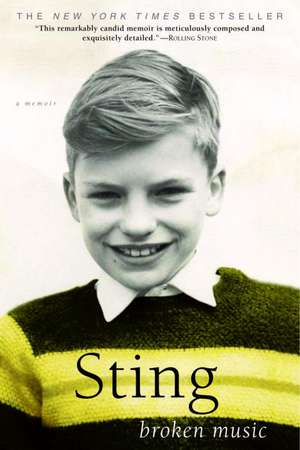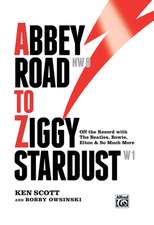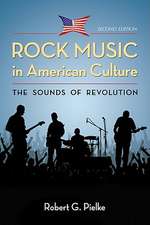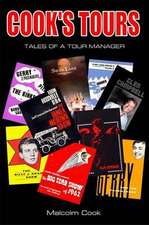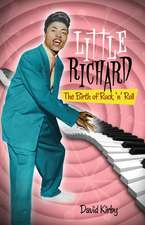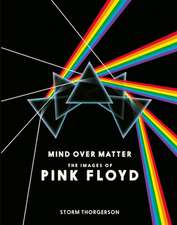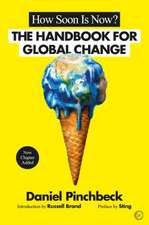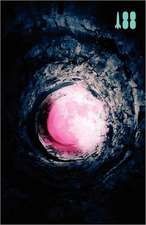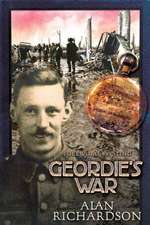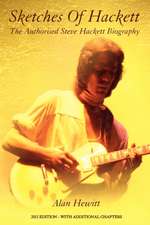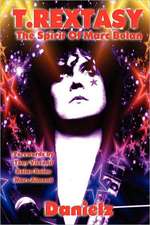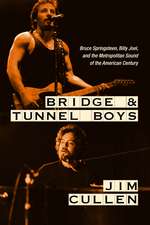Broken Music
Autor Stingen Limba Engleză Paperback – 31 dec 2004 – vârsta de la 14 până la 18 ani
And so Broken Music began to take shape. It is a book about the early part of my life, from childhood through adolescence, right up to the eve of my success with the Police. It is a story very few people know.
I had no interest in writing a traditional autobiographical recitation of everything that’s ever happened to me. Instead I found myself drawn to exploring specific moments, certain people and relationships, and particular events which still resonate powerfully for me as I try to understand the child I was, and the man I became.
From the Hardcover edition.
Preț: 74.26 lei
Preț vechi: 88.73 lei
-16% Nou
Puncte Express: 111
Preț estimativ în valută:
14.21€ • 15.43$ • 11.94£
14.21€ • 15.43$ • 11.94£
Carte disponibilă
Livrare economică 02-09 aprilie
Livrare express 18-22 martie pentru 36.39 lei
Preluare comenzi: 021 569.72.76
Specificații
ISBN-13: 9780385338653
ISBN-10: 0385338651
Pagini: 348
Dimensiuni: 140 x 209 x 20 mm
Greutate: 0.29 kg
Editura: Dial Press
ISBN-10: 0385338651
Pagini: 348
Dimensiuni: 140 x 209 x 20 mm
Greutate: 0.29 kg
Editura: Dial Press
Recenzii
“Sting’s gift for prose and reverence for language, nearly the equal of his musical gifts, shine on every page. Even when Broken Music addresses the quixotic life of an aspiring rock & roller, it reads like literature from a more rarified time when adults didn’t condescend to the vulgarities of pop culture.” —Rolling Stone
“You can’t fault his scrupulous candor.…A natural storyteller.” —London Sunday Times
“Sting mixes tenderness, sadness and humor in his narration, indulging readers with the same style of descriptive, pensive words that characterize his songs….Even readers unfamiliar with Sting’s music will find the book compelling.” —Associated Press “A beautifully styled, elegantly crafted and intelligent portrayal of Sting’s own life…[it] ranks on the highest shelf of literary debuts.” —Toronto Globe and Mail
“A first-rate memoir…Engrossing…With writing that is both witty and refreshingly self-deprecating, this book has pleasures that extend well beyond interest in the man’s music alone.” —People
“An engaging, lucidly written reminiscence…intellectually vigorous…elegant and thoughtful.” —Entertainment Weekly
From the Paperback edition.
“You can’t fault his scrupulous candor.…A natural storyteller.” —London Sunday Times
“Sting mixes tenderness, sadness and humor in his narration, indulging readers with the same style of descriptive, pensive words that characterize his songs….Even readers unfamiliar with Sting’s music will find the book compelling.” —Associated Press “A beautifully styled, elegantly crafted and intelligent portrayal of Sting’s own life…[it] ranks on the highest shelf of literary debuts.” —Toronto Globe and Mail
“A first-rate memoir…Engrossing…With writing that is both witty and refreshingly self-deprecating, this book has pleasures that extend well beyond interest in the man’s music alone.” —People
“An engaging, lucidly written reminiscence…intellectually vigorous…elegant and thoughtful.” —Entertainment Weekly
From the Paperback edition.
Extras
Music has always been my refuge from sadness. The guitar I inherited from my uncle John now has decent strings, and I’m no longer making the “broken” music that so upset my grandmother; in fact I’m making a lot of progress, but the limitations of my first instrument are holding me back. There are things that I simply can’t do with this primitive heirloom.
From the money I earned on the milk rounds I have saved up enough for a new acoustic guitar that I’ve had my eye on. It has been hanging from the wall in Braidford’s Music Shop for three months now. I go and see it after school every evening, praying that no one has bought it. It is a beautiful steel—stringed instrument with a blond finish, an ebony fingerboard, and delicate marquetry inlaid around the sound hole. It costs me sixteen guineas, which is a large amount of money, but I’m in love for the very first time.
I first heard the Beatles in my final year at junior school. I remember being in the changing rooms of the swimming baths. Mr. Law had just supervised one of our chaotic and impossibly noisy trips to the baths—by “supervised” I mean that no one had actually been drowned. We were drying ourselves off and, as was our custom, flicking towels at each other’s genitals. It was at this point that we heard the first bars of “Love Me Do” from a transistor radio in the corner. The effect was immediate. There was something in the sparseness of the sound that immediately put a stop to the horseplay. John’s lonely harmonica and Paul’s bass played “two to the bar,” and then the vocal harmony moved in modal fifths up to minor thirds and back again to a solo voice on the refrain. Not that I could articulate any of this at the time, but I recognized something significant, even revolutionary, in the spare economy of the sound, and the interesting thing is, so did everyone else.
By the time “She Loves You” reached number one in the charts I was already at the grammar school, but it wasn’t the confident primitivism of the “yeah yeah yeah” chorus that excited me so much as the G major chord with an added sixth that colored it at the end of the coda. Again, I couldn’t articulate this then, but I knew as the G major chord with an added sixth that colored it at the end of the coda. An old dance band cliché, but when the Beatles used it there seemed to be a subtle irony at work. Again, I couldn’t articulate this then, but I knew instinctively that it was pointing to a level of sophistication that I hadn’t been aware of in pop music until then. The Beatles would succeed in manipulating as many musical forms into their songs, whether classical, folk, rock and roll, the blues, Indian raga, or vaudeville, in a dizzying and seamless pastiche of ideas and cultural references. It was music without frontiers and the ubiquitous soundtrack for a generation that thought it could change the world.
Jim Berryman, in his otherwise excellent biography, A Sting in the Tale, claims that I was outside the City Hall when the Fab Four played there in 1963, and that I managed to grab a lock of McCartney’s hair. This is of course fantasy, and would have been out of keeping with the budding intellectual pretensions that I was nurturing at the time. But it is impossible to stress too much the influence that the Beatles had on my early life, and the fact that they came from a similar background to my own was fundamental to the vague plans of escape and glory that I was hatching in my imagination. Lennon and McCartney were both grammar school boys from humble roots in Liverpool, a town not dissimilar from Newcastle. From their initial chart successes they went on to conquer the world with songs that they wrote themselves. This gave an entire generation of musicians the confidence and permission to at least attempt the same feat.
I pore over Beatles albums with the same obsessive and forensic scrutiny that I’d applied to Rodgers and Hammerstein, only now I have a guitar. I have an instrument that can reproduce the practical magic of the chord structures and the network of riffs that their songs are built on. And what songs, one after the other, album after album. I learn to play them all, confident that if I persevere, what I can’t play immediately will yield its secret eventually. I will reapply the needle of the record player again and again to the bars of music that seem beyond my analysis, like a safecracker picking a lock, until the prize is mine. No school subject ever occupies as much of my time or energy. I’m not claiming that any kind of prescience about the future is at work here, but there is something in the driven and compulsive nature of this obsession that is unusual, something in the unconscious saying, This is how you escape. This is how you escape.
It is 1966 and England, having won the World Cup against Germany that summer, is at last enjoying the fruits of the postwar boom and is considered to be, in the quaint argot of the time, “swinging.” In Newcastle, however, the hedonism of social change and cultural revolution is limited to a small enclave surrounding the university. King’s College gives the pubs and clubs and bookshops an air of musty intellectualism and bohemian sophistication. Wittgenstein, of all people, is supposed to have spent some time in the city during the war—I can just see him trying to explain the more difficult passages of Tractatus Logico-Philosophicus to the coves in the Haymarket snug in a blue haze of Woodbines and brown ale.
The Club A Go-Go is above some shops in Percy Street, behind the Haymarket. It was originally a jazz club catering to the sophisticated tastes that developed in and around the university. The Go-Go is where the Animals had their residency before they hit the big time, and living proof that the Beatles miracle could be repeated, even in Newcastle. When I am fifteen years old, the first live band I ever see is there: the Graham Bond Organisation. It is a fortunate introduction. Graham Bond is a big round-faced man with long greasy hair and a mandarin mustache. He plays Hammond organ and alto sax and sings in a gruff and passionate baritone. His band contains figures who will soon become legends: Jack Bruce and Ginger Baker, who will become more famous as members of Cream, on bass and drums respectively, and Dick Heckstall-Smith on tenor. The music is harsh and uncompromising and I’m not sure if I like it, but I have a strong sense that what is being played has a weight and a seriousness that will later be characterized and then caricatured as “heavy.” Graham Bond would later become obsessed with the occult and end his own life under a train in London’s Underground.
I go to see John Mayall’s Bluesbreakers, again at the Go-Go, although I don’t remember which of their subsequently legendary guitarists was on duty that night. It certainly wasn’t Clapton, though it may have been Peter Green. But it wasn’t until December of that year that I really had my mind blown.
I would watch Top of the Pops with a religious devotion at 7:30 every Thursday evening. I loved this show with a passion. Almost forty years later I can still see a picture of the DJ, Jimmy Savile, standing in front of a large chart of the top twenty, circa 1966, and am able to sing a line from every entry. Such familiarity with the music of the time could not, however, have prepared me for the whirlwind, the tidal wave, the earthquake, the force of nature that was Jimi Hendrix.
The Jimi Hendrix Experience appeared on Top of the Pops in December of 1966 and changed everything. Hendrix had transformed “Hey Joe,” an old folk song, and propelled it by the elegant ferocity of his guitar playing into a sassy, bluesy vehicle of awesome power. His vocal was as sulky and offhand as it was passionate and openly sexual, and as the three-piece band stormed through the three-minute song, I imagined everyone in whole country in front of their tellys sitting bolt upright in their chairs.
Wow! What the fuck was that?
It seemed only days later that he would be booked to appear at the Go-Go. The excitement in the town is palpable. I am technically too young to gain admission to a nightclub, but because of my height I can easily pass for eighteen. I have brought a change of clothes in my schoolbag, a pair of Levi’s and a white Ben Sherman shirt with a button-down collar. These are the “coolest” clothes I have, and look fine under my school overcoat. I change out of my uniform in the toilets at the Central Station, trying not to breathe. The lavatory is foul with the pungent stench of urine and sadness. I dress with mesmeric slowness, not wanting to drop any of my clothes on the filthy floor, beneath a faded Ministry of Health poster warning of the dangers of VD. Some hope! I still haven’t come close to having sex. There are no girls at school, and most of my evenings are taken up traveling home on trains and buses. When I do get home, I usually have a punitive amount of work to do, and when on those rare opportunities I do meet girls I am painfully shy and haven’t a clue what to say. But the other reason is music; I already have my passion. I stow my bag in the lockers at the station and set off at a brisk pace for Percy Street, breathing in the crisp air of the evening in grateful gulps and anticipating something extraordinary.
There is a long queue stretching around the corner. I tuck myself into the end of the line and wait. I imagine I’m one of the youngest people there, although my height allows me some anonymity in the crowd. They are mainly boys, dressed much the same as me, although a few dandified “exotics” have managed to purchase Afghan coats and are sporting droopy Zapata mustaches and spiffy desert boots. The girls all have the same style, hair parted severely in the middle and falling in lank sheets to the shoulders of black leather coats. There is an atmosphere of seriousness, though, that pervades the crowd, as if we are about to witness an event of high cultural significance. Hendrix will play two sets. I manage to scrape in for the first one, which is fortunate, as I would have had to find some convincing excuse to stay out so late for the second. My parents have no idea where I am, and I have no wish to tell them. One of the dividends of my alienation is that I don’t have much explaining to do and am pretty much left to my own devices.
The club is tiny and I secure a pitch for myself halfway between the stage and the back wall. I will have no trouble seeing. The band of course are late. The crowd waits patiently.
They say that “if you remember the sixties, then you weren’t there.”
Well, much the same could be said of this gig. The Jimi Hendrix Experience was an overwhelming, deafening wave of sound that simply obliterated analysis. I think I remember snatches of “Hey Joe” and “Foxy Lady,” but that event remains a blur of noise and breathtaking virtuosity, of Afro’d hair, wild clothes, and towers of Marshall amplifiers. It was also the first time I’d ever seen a black man. I remember Hendrix creating a hole in the plaster ceiling above the stage with the head of his guitar, and then it was over.
I lay in my bed that night with my ears ringing and my worldview significantly altered.
I did enough schoolwork to get by, but no more. All I wanted to do was play the guitar and listen to records. I listened exhaustively to Dylan and memorized great tracts of his lyricism, from “The Lonesome Death of Hattie Carroll” to “Gates of Eden.” I also learned to like jazz, the hard way.
I developed a number of friendships with older boys in the school who recognized the seriousness of my musical obsessions. One of them lent me two albums by Thelonious Monk, Monk Live at Olympia in Paris and Monk Solo. I was at first baffled by the angular complexity of the melodies and the density of the underlying harmonies, but had an inkling that there was something important here. I persevered, in the same way I persevered with the books my grandmother lent me, or the way I figured out how to play the guitar pragmatically, unschooled but determined. I had no intellectual approach, just sheer bloody-mindedness. I would come home from school, put Monk on, begin my homework, and let the music teach me by osmosis as I struggled with some abstruse geometry proof. When I heard Miles Davis and John Coltrane, I realized that these musicians were exploring the outer reaches of human understanding like physicists in a sound laboratory.
I wonder if I would have developed even a small understanding of such music if I hadn’t first put the time and effort into listening. I am no jazz musician, but I’ve put in enough work to have some understanding of it and develop a common language with those who do play it.
By 1967 my parents have saved enough money to move the family to a semidetached house near the coast in Tynemouth, only a few miles downriver from Wallsend. After all these years they’re miraculously still together, or at least nominally so, being under the same roof. Divorce simply isn’t an option for people like us, either financially or socially. It just isn’t done. I’m relieved that we haven’t had to deal with the seismic upheaval of a divorce, but sometimes, exhausted by the constant emotional static that crackles and then festers just below the surface of the house, I wish the whole thing would just blow itself sky-high, once and for all.
I am too awkward and clumsy to be much good at football, but I can run. No one has ever beaten me over one hundred yards at any of the schools I have attended. I am big-boned and strong from all the exercise I get working with my dad and, of course, all the free milk.
I hold the school record for the hundred yards and have qualified for the Northumberland County championships in Ashington. It is the summer of 1967 and I am sixteen. This is the biggest race of my life. I can recall the nausea of waiting for the starting pistol, the agony of the silences between the instructions: “On your marks…” My spiked feet in their blocks, measuring the distance between my left knee and my fingertips. “Get set…” Now an eternity as I raise my head and push back on my hips and stare down the long tunnel to the finishing line. Bang!
I return home that evening flushed with pride and victory, having won the race by a good length and blurting out the news of my triumph to my father, who is rousing himself from his afternoon sleep on the sofa. “That’s very nice, son,” is his only response, before he drifts off to the kitchen to make himself a cup of tea. I am at first deflated and then angry at him. He is too embedded in his own unhappiness to be able to really share in my success or take pride in it as something that he himself helped to create. His pride in me will continue to be ossified in the bones of his sadness, unvoiced. I understand this now, but I didn’t then.
My running career ends that summer after I am beaten for the first time in the early rounds of a national tournament. I have lost heart in the sport, consoling myself with the knowledge that there is no strategy involved in sprinting, no real tactical training. You are either born with the right musculature to be the fastest, or you are not. Excellence in sports is cruelly definitive, and this is the nausea in the pit of your stomach and in your throat, this is the fear—that you will not be good enough, that you will be beaten, that you will fail.
I begin to fantasize that I will no longer seek my father’s attention, and yet a lot of my life has been nothing but a vain attempt to find approval, to find acceptance. And no matter how full my belly, I wonder, will I always feel hungry?
While I despise the new house and its suburban pretensions, it does have a garden, which my dad loves though he has to get up even earlier and drive back to Wallsend to do his round. He builds what he calls a conservatory in the back garden, but in reality it’s a jerry-built shed with windows. He spends most of his days in there with the spiders and some sad-looking cactuses.
My mother still goes out on a Thursday night to an undisclosed location assumed to be Nancy’s house, but nothing is ever said. The walls are too thin for voices to be raised. We are like a family of Trappists, cloistered in our own silences. I can’t be much of an elder brother to my siblings. I’m sure they’re as confused as I am, because when I’m not actually missing from the house, I’m just emotionally absent, for although I love them dearly, and I think they love me, I can’t really express any interest in them or risk any emotion. They must think I’m a cold fish, but I have no idea what they know or what they can tolerate. I share a back bedroom with my brother and a view of the ocean—that is, it has a view of the ocean if you climb on top of the wardrobe and peer over the rooftops, and there in the distance will be the gray, forbidding horizon of the North Sea. I get out as much as I can. I will use up whole days wandering up and down the beaches from Tynemouth to Whitley Bay, drifting with the tides, aimlessly walking and thinking.
I begin to spend a lot of my evenings at the YMCA in Whitley Bay, and befriend two brothers, Ken and Pete Brigham. Ken, like me, goes to a grammar school in Newcastle. He is an excellent musician and plays piano and guitar. Pete, who is a couple of years older than we are, is an apprentice chef and plays the bass. Pete has actually built this instrument himself, and I am stunned by his ingenuity. The bass is functional without being crude, utilitarian without being ugly. He explains to me the electronic mysteries of the single-coil pickup, the mathematics of scale length and the crucial distances between the frets on the fingerboard. This will be my first introduction to the cult of the bass guitar. I have not really taken much interest in the instrument, regarding myself exclusively as a lead guitarist because I could now make passable attempts at Hendrix riffs, using this new skill to inveigle my way into the coterie of young musicians who gather in the music room most weeknights. I am the kid who can play “Purple Haze,” and this becomes my calling card. From such small beginnings reputations are made. I probably teach that riff to half the kids in the YM.
One of these kids is Keith Gallagher, who will be the best man at my wedding, as I will be at his. A lifelong friend and an early supporter, it is with his enthusiasm encouragement that I dare to imagine that I have something that sets me apart as a musician, that somehow the dream can be nurtured into reality.
Keith has a practical nature. He is apprenticed to an engineering firm in Newcastle and attends night school. He also had the ambition and tenacity to get a good degree and eventually become a leading consultant engineer. Although my convoluted route to success will be far less structured, we must have recognized in each other similar traits, similar desires to escape the confined world of our parents. We walk the beaches together, talking and fantasizing, sometimes until the early hours of the morning. Keith is the first person to hear my early songwriting efforts, and although they are probably awful, he shows just enough interest to encourage me to carry on. (He did remind me recently that one of my earliest efforts concerned a flower in the desert. I had long forgotten this before I came to write a song called “Desert Rose,” which would sell over a million copies thirty-five years later. It still seems fantastic to me that something as private as a song can become public property, but maybe all it takes is just one person to believe in what you are doing to give you the confidence to keep trying.)
While Keith is my Svengali it is Ken, the younger of the Brigham brothers, who will be my mentor. We learn old Freddie King numbers like “The Stumble” and “Hide Away” note for note, and play these tunes ad nauseam. Brother Pete plods away on the bass while Ken and I wheedle and deedle our way through the blues. We go to see Peter Green in Fleetwood Mac, Stan Webb in Chicken Shack, and John Mayall’s Bluesbreakers, feeding our fantasies that we too can become bluesmen. When we aren’t playing in the YM we are practicing up in Ken’s bedroom, which is in the attic of a Victorian terraced house near the seafront. One night Pete has a date and won’t be able to do the honors on bass, so I nobly volunteer to take up the support role while Ken wheedles and deedles.
The bass feels strange in your hands when you’ve been used to the smaller instrument with its narrow strings and short neck. The bass has a weight and a heft to it that feels like a weapon, yet there is a quiet beauty to it as well. This instrument is the root of all harmony, the bedrock at the bottom of the stave upon which music is constructed. When I accompanied Ken, I realized that whatever he played was harmonically defined by the notes on the bass. If he were to play the upper partials of a C chord on the guitar, it would only be a C chord if I played C in the bass. So I began to form in my mind what I can only describe as a strategy. A vague one, but nonetheless a strategy that the bass, while being far from flashy, would suit the covert side of my personality much better than the guitar. It would be a quieter heroism I would seek, stoic and grounded like my father’s. My ambitions would become concrete from the ground up, hidden yet effective. I would suppress my desire to shine spectacularly in favor of digging deep and marking time in what I somehow knew would become a lifelong campaign.
—excerpted from BROKEN MUSIC: A Memoir by Sting
Copyright © 2003 - by Sting
Posted with permission. All Rights Reserved.
From the Hardcover edition.
From the money I earned on the milk rounds I have saved up enough for a new acoustic guitar that I’ve had my eye on. It has been hanging from the wall in Braidford’s Music Shop for three months now. I go and see it after school every evening, praying that no one has bought it. It is a beautiful steel—stringed instrument with a blond finish, an ebony fingerboard, and delicate marquetry inlaid around the sound hole. It costs me sixteen guineas, which is a large amount of money, but I’m in love for the very first time.
I first heard the Beatles in my final year at junior school. I remember being in the changing rooms of the swimming baths. Mr. Law had just supervised one of our chaotic and impossibly noisy trips to the baths—by “supervised” I mean that no one had actually been drowned. We were drying ourselves off and, as was our custom, flicking towels at each other’s genitals. It was at this point that we heard the first bars of “Love Me Do” from a transistor radio in the corner. The effect was immediate. There was something in the sparseness of the sound that immediately put a stop to the horseplay. John’s lonely harmonica and Paul’s bass played “two to the bar,” and then the vocal harmony moved in modal fifths up to minor thirds and back again to a solo voice on the refrain. Not that I could articulate any of this at the time, but I recognized something significant, even revolutionary, in the spare economy of the sound, and the interesting thing is, so did everyone else.
By the time “She Loves You” reached number one in the charts I was already at the grammar school, but it wasn’t the confident primitivism of the “yeah yeah yeah” chorus that excited me so much as the G major chord with an added sixth that colored it at the end of the coda. Again, I couldn’t articulate this then, but I knew as the G major chord with an added sixth that colored it at the end of the coda. An old dance band cliché, but when the Beatles used it there seemed to be a subtle irony at work. Again, I couldn’t articulate this then, but I knew instinctively that it was pointing to a level of sophistication that I hadn’t been aware of in pop music until then. The Beatles would succeed in manipulating as many musical forms into their songs, whether classical, folk, rock and roll, the blues, Indian raga, or vaudeville, in a dizzying and seamless pastiche of ideas and cultural references. It was music without frontiers and the ubiquitous soundtrack for a generation that thought it could change the world.
Jim Berryman, in his otherwise excellent biography, A Sting in the Tale, claims that I was outside the City Hall when the Fab Four played there in 1963, and that I managed to grab a lock of McCartney’s hair. This is of course fantasy, and would have been out of keeping with the budding intellectual pretensions that I was nurturing at the time. But it is impossible to stress too much the influence that the Beatles had on my early life, and the fact that they came from a similar background to my own was fundamental to the vague plans of escape and glory that I was hatching in my imagination. Lennon and McCartney were both grammar school boys from humble roots in Liverpool, a town not dissimilar from Newcastle. From their initial chart successes they went on to conquer the world with songs that they wrote themselves. This gave an entire generation of musicians the confidence and permission to at least attempt the same feat.
I pore over Beatles albums with the same obsessive and forensic scrutiny that I’d applied to Rodgers and Hammerstein, only now I have a guitar. I have an instrument that can reproduce the practical magic of the chord structures and the network of riffs that their songs are built on. And what songs, one after the other, album after album. I learn to play them all, confident that if I persevere, what I can’t play immediately will yield its secret eventually. I will reapply the needle of the record player again and again to the bars of music that seem beyond my analysis, like a safecracker picking a lock, until the prize is mine. No school subject ever occupies as much of my time or energy. I’m not claiming that any kind of prescience about the future is at work here, but there is something in the driven and compulsive nature of this obsession that is unusual, something in the unconscious saying, This is how you escape. This is how you escape.
It is 1966 and England, having won the World Cup against Germany that summer, is at last enjoying the fruits of the postwar boom and is considered to be, in the quaint argot of the time, “swinging.” In Newcastle, however, the hedonism of social change and cultural revolution is limited to a small enclave surrounding the university. King’s College gives the pubs and clubs and bookshops an air of musty intellectualism and bohemian sophistication. Wittgenstein, of all people, is supposed to have spent some time in the city during the war—I can just see him trying to explain the more difficult passages of Tractatus Logico-Philosophicus to the coves in the Haymarket snug in a blue haze of Woodbines and brown ale.
The Club A Go-Go is above some shops in Percy Street, behind the Haymarket. It was originally a jazz club catering to the sophisticated tastes that developed in and around the university. The Go-Go is where the Animals had their residency before they hit the big time, and living proof that the Beatles miracle could be repeated, even in Newcastle. When I am fifteen years old, the first live band I ever see is there: the Graham Bond Organisation. It is a fortunate introduction. Graham Bond is a big round-faced man with long greasy hair and a mandarin mustache. He plays Hammond organ and alto sax and sings in a gruff and passionate baritone. His band contains figures who will soon become legends: Jack Bruce and Ginger Baker, who will become more famous as members of Cream, on bass and drums respectively, and Dick Heckstall-Smith on tenor. The music is harsh and uncompromising and I’m not sure if I like it, but I have a strong sense that what is being played has a weight and a seriousness that will later be characterized and then caricatured as “heavy.” Graham Bond would later become obsessed with the occult and end his own life under a train in London’s Underground.
I go to see John Mayall’s Bluesbreakers, again at the Go-Go, although I don’t remember which of their subsequently legendary guitarists was on duty that night. It certainly wasn’t Clapton, though it may have been Peter Green. But it wasn’t until December of that year that I really had my mind blown.
I would watch Top of the Pops with a religious devotion at 7:30 every Thursday evening. I loved this show with a passion. Almost forty years later I can still see a picture of the DJ, Jimmy Savile, standing in front of a large chart of the top twenty, circa 1966, and am able to sing a line from every entry. Such familiarity with the music of the time could not, however, have prepared me for the whirlwind, the tidal wave, the earthquake, the force of nature that was Jimi Hendrix.
The Jimi Hendrix Experience appeared on Top of the Pops in December of 1966 and changed everything. Hendrix had transformed “Hey Joe,” an old folk song, and propelled it by the elegant ferocity of his guitar playing into a sassy, bluesy vehicle of awesome power. His vocal was as sulky and offhand as it was passionate and openly sexual, and as the three-piece band stormed through the three-minute song, I imagined everyone in whole country in front of their tellys sitting bolt upright in their chairs.
Wow! What the fuck was that?
It seemed only days later that he would be booked to appear at the Go-Go. The excitement in the town is palpable. I am technically too young to gain admission to a nightclub, but because of my height I can easily pass for eighteen. I have brought a change of clothes in my schoolbag, a pair of Levi’s and a white Ben Sherman shirt with a button-down collar. These are the “coolest” clothes I have, and look fine under my school overcoat. I change out of my uniform in the toilets at the Central Station, trying not to breathe. The lavatory is foul with the pungent stench of urine and sadness. I dress with mesmeric slowness, not wanting to drop any of my clothes on the filthy floor, beneath a faded Ministry of Health poster warning of the dangers of VD. Some hope! I still haven’t come close to having sex. There are no girls at school, and most of my evenings are taken up traveling home on trains and buses. When I do get home, I usually have a punitive amount of work to do, and when on those rare opportunities I do meet girls I am painfully shy and haven’t a clue what to say. But the other reason is music; I already have my passion. I stow my bag in the lockers at the station and set off at a brisk pace for Percy Street, breathing in the crisp air of the evening in grateful gulps and anticipating something extraordinary.
There is a long queue stretching around the corner. I tuck myself into the end of the line and wait. I imagine I’m one of the youngest people there, although my height allows me some anonymity in the crowd. They are mainly boys, dressed much the same as me, although a few dandified “exotics” have managed to purchase Afghan coats and are sporting droopy Zapata mustaches and spiffy desert boots. The girls all have the same style, hair parted severely in the middle and falling in lank sheets to the shoulders of black leather coats. There is an atmosphere of seriousness, though, that pervades the crowd, as if we are about to witness an event of high cultural significance. Hendrix will play two sets. I manage to scrape in for the first one, which is fortunate, as I would have had to find some convincing excuse to stay out so late for the second. My parents have no idea where I am, and I have no wish to tell them. One of the dividends of my alienation is that I don’t have much explaining to do and am pretty much left to my own devices.
The club is tiny and I secure a pitch for myself halfway between the stage and the back wall. I will have no trouble seeing. The band of course are late. The crowd waits patiently.
They say that “if you remember the sixties, then you weren’t there.”
Well, much the same could be said of this gig. The Jimi Hendrix Experience was an overwhelming, deafening wave of sound that simply obliterated analysis. I think I remember snatches of “Hey Joe” and “Foxy Lady,” but that event remains a blur of noise and breathtaking virtuosity, of Afro’d hair, wild clothes, and towers of Marshall amplifiers. It was also the first time I’d ever seen a black man. I remember Hendrix creating a hole in the plaster ceiling above the stage with the head of his guitar, and then it was over.
I lay in my bed that night with my ears ringing and my worldview significantly altered.
I did enough schoolwork to get by, but no more. All I wanted to do was play the guitar and listen to records. I listened exhaustively to Dylan and memorized great tracts of his lyricism, from “The Lonesome Death of Hattie Carroll” to “Gates of Eden.” I also learned to like jazz, the hard way.
I developed a number of friendships with older boys in the school who recognized the seriousness of my musical obsessions. One of them lent me two albums by Thelonious Monk, Monk Live at Olympia in Paris and Monk Solo. I was at first baffled by the angular complexity of the melodies and the density of the underlying harmonies, but had an inkling that there was something important here. I persevered, in the same way I persevered with the books my grandmother lent me, or the way I figured out how to play the guitar pragmatically, unschooled but determined. I had no intellectual approach, just sheer bloody-mindedness. I would come home from school, put Monk on, begin my homework, and let the music teach me by osmosis as I struggled with some abstruse geometry proof. When I heard Miles Davis and John Coltrane, I realized that these musicians were exploring the outer reaches of human understanding like physicists in a sound laboratory.
I wonder if I would have developed even a small understanding of such music if I hadn’t first put the time and effort into listening. I am no jazz musician, but I’ve put in enough work to have some understanding of it and develop a common language with those who do play it.
By 1967 my parents have saved enough money to move the family to a semidetached house near the coast in Tynemouth, only a few miles downriver from Wallsend. After all these years they’re miraculously still together, or at least nominally so, being under the same roof. Divorce simply isn’t an option for people like us, either financially or socially. It just isn’t done. I’m relieved that we haven’t had to deal with the seismic upheaval of a divorce, but sometimes, exhausted by the constant emotional static that crackles and then festers just below the surface of the house, I wish the whole thing would just blow itself sky-high, once and for all.
I am too awkward and clumsy to be much good at football, but I can run. No one has ever beaten me over one hundred yards at any of the schools I have attended. I am big-boned and strong from all the exercise I get working with my dad and, of course, all the free milk.
I hold the school record for the hundred yards and have qualified for the Northumberland County championships in Ashington. It is the summer of 1967 and I am sixteen. This is the biggest race of my life. I can recall the nausea of waiting for the starting pistol, the agony of the silences between the instructions: “On your marks…” My spiked feet in their blocks, measuring the distance between my left knee and my fingertips. “Get set…” Now an eternity as I raise my head and push back on my hips and stare down the long tunnel to the finishing line. Bang!
I return home that evening flushed with pride and victory, having won the race by a good length and blurting out the news of my triumph to my father, who is rousing himself from his afternoon sleep on the sofa. “That’s very nice, son,” is his only response, before he drifts off to the kitchen to make himself a cup of tea. I am at first deflated and then angry at him. He is too embedded in his own unhappiness to be able to really share in my success or take pride in it as something that he himself helped to create. His pride in me will continue to be ossified in the bones of his sadness, unvoiced. I understand this now, but I didn’t then.
My running career ends that summer after I am beaten for the first time in the early rounds of a national tournament. I have lost heart in the sport, consoling myself with the knowledge that there is no strategy involved in sprinting, no real tactical training. You are either born with the right musculature to be the fastest, or you are not. Excellence in sports is cruelly definitive, and this is the nausea in the pit of your stomach and in your throat, this is the fear—that you will not be good enough, that you will be beaten, that you will fail.
I begin to fantasize that I will no longer seek my father’s attention, and yet a lot of my life has been nothing but a vain attempt to find approval, to find acceptance. And no matter how full my belly, I wonder, will I always feel hungry?
While I despise the new house and its suburban pretensions, it does have a garden, which my dad loves though he has to get up even earlier and drive back to Wallsend to do his round. He builds what he calls a conservatory in the back garden, but in reality it’s a jerry-built shed with windows. He spends most of his days in there with the spiders and some sad-looking cactuses.
My mother still goes out on a Thursday night to an undisclosed location assumed to be Nancy’s house, but nothing is ever said. The walls are too thin for voices to be raised. We are like a family of Trappists, cloistered in our own silences. I can’t be much of an elder brother to my siblings. I’m sure they’re as confused as I am, because when I’m not actually missing from the house, I’m just emotionally absent, for although I love them dearly, and I think they love me, I can’t really express any interest in them or risk any emotion. They must think I’m a cold fish, but I have no idea what they know or what they can tolerate. I share a back bedroom with my brother and a view of the ocean—that is, it has a view of the ocean if you climb on top of the wardrobe and peer over the rooftops, and there in the distance will be the gray, forbidding horizon of the North Sea. I get out as much as I can. I will use up whole days wandering up and down the beaches from Tynemouth to Whitley Bay, drifting with the tides, aimlessly walking and thinking.
I begin to spend a lot of my evenings at the YMCA in Whitley Bay, and befriend two brothers, Ken and Pete Brigham. Ken, like me, goes to a grammar school in Newcastle. He is an excellent musician and plays piano and guitar. Pete, who is a couple of years older than we are, is an apprentice chef and plays the bass. Pete has actually built this instrument himself, and I am stunned by his ingenuity. The bass is functional without being crude, utilitarian without being ugly. He explains to me the electronic mysteries of the single-coil pickup, the mathematics of scale length and the crucial distances between the frets on the fingerboard. This will be my first introduction to the cult of the bass guitar. I have not really taken much interest in the instrument, regarding myself exclusively as a lead guitarist because I could now make passable attempts at Hendrix riffs, using this new skill to inveigle my way into the coterie of young musicians who gather in the music room most weeknights. I am the kid who can play “Purple Haze,” and this becomes my calling card. From such small beginnings reputations are made. I probably teach that riff to half the kids in the YM.
One of these kids is Keith Gallagher, who will be the best man at my wedding, as I will be at his. A lifelong friend and an early supporter, it is with his enthusiasm encouragement that I dare to imagine that I have something that sets me apart as a musician, that somehow the dream can be nurtured into reality.
Keith has a practical nature. He is apprenticed to an engineering firm in Newcastle and attends night school. He also had the ambition and tenacity to get a good degree and eventually become a leading consultant engineer. Although my convoluted route to success will be far less structured, we must have recognized in each other similar traits, similar desires to escape the confined world of our parents. We walk the beaches together, talking and fantasizing, sometimes until the early hours of the morning. Keith is the first person to hear my early songwriting efforts, and although they are probably awful, he shows just enough interest to encourage me to carry on. (He did remind me recently that one of my earliest efforts concerned a flower in the desert. I had long forgotten this before I came to write a song called “Desert Rose,” which would sell over a million copies thirty-five years later. It still seems fantastic to me that something as private as a song can become public property, but maybe all it takes is just one person to believe in what you are doing to give you the confidence to keep trying.)
While Keith is my Svengali it is Ken, the younger of the Brigham brothers, who will be my mentor. We learn old Freddie King numbers like “The Stumble” and “Hide Away” note for note, and play these tunes ad nauseam. Brother Pete plods away on the bass while Ken and I wheedle and deedle our way through the blues. We go to see Peter Green in Fleetwood Mac, Stan Webb in Chicken Shack, and John Mayall’s Bluesbreakers, feeding our fantasies that we too can become bluesmen. When we aren’t playing in the YM we are practicing up in Ken’s bedroom, which is in the attic of a Victorian terraced house near the seafront. One night Pete has a date and won’t be able to do the honors on bass, so I nobly volunteer to take up the support role while Ken wheedles and deedles.
The bass feels strange in your hands when you’ve been used to the smaller instrument with its narrow strings and short neck. The bass has a weight and a heft to it that feels like a weapon, yet there is a quiet beauty to it as well. This instrument is the root of all harmony, the bedrock at the bottom of the stave upon which music is constructed. When I accompanied Ken, I realized that whatever he played was harmonically defined by the notes on the bass. If he were to play the upper partials of a C chord on the guitar, it would only be a C chord if I played C in the bass. So I began to form in my mind what I can only describe as a strategy. A vague one, but nonetheless a strategy that the bass, while being far from flashy, would suit the covert side of my personality much better than the guitar. It would be a quieter heroism I would seek, stoic and grounded like my father’s. My ambitions would become concrete from the ground up, hidden yet effective. I would suppress my desire to shine spectacularly in favor of digging deep and marking time in what I somehow knew would become a lifelong campaign.
—excerpted from BROKEN MUSIC: A Memoir by Sting
Copyright © 2003 - by Sting
Posted with permission. All Rights Reserved.
From the Hardcover edition.
Descriere
Focusing on special moments that resonated powerfully, the singer explores the early part of his life from childhood to adolescence.
Notă biografică
Sting
